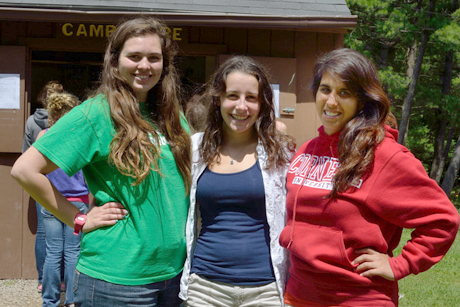Undergrads go to camp - and study teen transitions
By Olivia M. Hall

Summer camp is often about archery, swimming and singing around the fire. But this past summer, Natasha Herrick ’15, Leticia Vasquez ’15 and Meredith Moser ’15 were in for a different kind of camp adventure – their first academic research study.
Working with Jane Mendle, assistant professor of human development in the College of Human Ecology, the three served as research assistants for a pilot study to test expressive writing interventions with adolescent girls at 4-H Camp Bristol Hills in Canandaigua, N.Y.
The project, funded partly by Cornell’s Bronfenbrenner Center for Translational Research, formed when Tim Davis, 4-H youth development program leader with Cornell Cooperative Extension (CCE) of Ontario County, discussed possible collaborations at the residential summer camp with Mendle.
“Everybody knows that puberty is rough on kids, as relationships with parents and peers are changing,” Mendle said. “Our lab, like a lot of others interested in puberty, tends to focus on the consequences of puberty – which can include depression, anxiety, externalizing or ‘acting out’ behaviors, poor self-esteem and body dissatisfaction. In this project we wanted to explore what happens if we intervene before teens get to that point.”
Mendle’s research assistants lived at Bristol Hills and used free slushies to recruit 45 girls, ages 11 to 13. (Boys will be included in a future study.) During six, weeklong camp sessions, the RAs gathered the girls after lunch on four days for an exercise in expressive writing, which Mendle describes as “a brief, focused intervention, in which people write about times of change in their lives.”
After filling out a standard psychological questionnaire on the first day, the girls spent 20 minutes daily writing about their relationships with their families, friends and the changes taking place in their own bodies
Though the data have yet to be fully analyzed – Mendle is planning to send out a follow-up questionnaire in a few months – the research partners are pleased with the outcomes to date of this first-time collaboration.
“4-H camps put a real emphasis on how the camp experience will develop the whole child,” said Davis. “This year we were really able to pilot how we can work with faculty to do research at the camp while greatly benefiting our campers.”
Mendle hopes to use the pilot data to write a grant proposal that will expand the study to include a control group and show more clearly how the writing intervention provides positive benefits to adolescents.
The undergraduate assistants, for their part, found their interest in working with adolescents confirmed. “This research helped to further convince me that kids in this age range and young adults are the focus I’d like to pursue later in life if I ever get my own private practice as a therapist,” said Vasquez.
Herrick, Moser and Vasquez assisted with the study as part of the CCE Summer Internship Program, which provides opportunities for Human Ecology and College of Agriculture and Life Sciences students to support research and outreach projects in communities around the state. The RAs also assisted in a separate study on social exclusion among adolescents, led by Vivian Zayas, Cornell associate professor of psychology.
On Tuesday, Sept. 24, they and other CCE summer interns will present posters about their work at a reception, 5-6:30 p.m., in the Statler Ballroom.
Olivia M. Hall is a freelance writer.
Media Contact
Get Cornell news delivered right to your inbox.
Subscribe